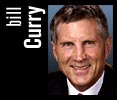 |

|
| Saturday, December 15 Irish acted with haste when under pressure By Bill Curry Special to ESPN.com |
||||||||||
|
I do not know George O'Leary very well. I am an alumnus of Georgia Tech, but my work as a college football analyst has prevented me from seeing many Tech games. I have worked only one game, ironically the Yellow Jackets regular-season finale at Tallahassee. But I do know football coaches. Football coaches are great dreamers. We believe we can overcome, create the master plan, be the difference. Our character varies with the same diversity of ambition and moral structure as military leaders. Our "characters" run the gamut from some of the best to some of the worst role models. We share one common attribute -- we are, almost to a man, driven souls. We believe in winning, if not at all costs, at least at dear cost. We work 90-hour weeks, month after month, year after year, in pursuit of the perfect performance. We exact severe tolls on family, personal relationships and our own health, certain that when we "win it all" everyone will understand, even cheer. When one of us slips, either by losing too many games or doing something reprehensible, judgment is swift and merciless. Metaphorically, it is a public execution. If you doubt my words, watch the sneers and listen to the jeers when one of us goes down. Imagine yourself the object of such. George O'Leary is a good coach who, by his own admission, made a terrible mistake. The nature of his deception guaranteed his rejection by Notre Dame and Georgia Tech. He deserves that. We should leave it at that, and allow the man to restore himself in the manner he chooses. We also should question a process that leads great institutions of higher learning to hire coaches without standard business practices. How could Georgia Tech and Notre Dame have executed contracts for millions of dollars without exercising routine background checks? What is it that spurs news conferences like the one we saw at Notre Dame? Athletics director Kevin White used words like "extensive national search," and locating "a man that can return us to the national championship." In seven days? Coast to coast? With at least three candidates ahead of O'Leary? Please. Here is what really happened. Notre Dame got in a hurry. Anxious to snag every blue-chip recruit on its list, it jumped right into the "quick fix" culture with both feet. Ever watch a two-minute drill in which the offense is in such haste that it cannot execute the basics? Can't get lined up? Jumps the snap count? Notre Dame lined up offside, and it is not alone. Nowhere in the mission statements of our universities do the words "compete with the National Football League for the entertainment dollar" appear. Nowhere in the budgets for higher education are millions of dollars allocated for the salaries of head coaches. Yet each year, we are treated to press conferences during which presidents and athletics directors proudly announce grandiose visions for the future that center around the latest football genius, stadium expansion or enhanced "participation opportunities" for season-ticket holders. The faithful then learn that the opportunities include an added $2,500 cost for the privilege of purchasing tickets for the same seats they have sat in for decades. It happens every year. Who is responsible? All of us, that's who. Americans' favorite sport is taking something good and doing it to such excess that it becomes bad. When one takes a head coaching job in our sport now, the wins are the product, not the graduates. No matter the cost, that narcotic called victory is the only thing to calm the addicted tribes of fans. It is the quick fix society in its ultimate expression. Will it change soon? Is there a ready bromide to quickly fix the quick-fix mindset? Of course not. But at least the next time you are tempted to sneer when your least favorite coach's head goes on the block, or sit in hysteria while your coach of choice is being announced, you will know what you are watching. Bill Curry is a college football analyst for ESPN |
| |||||||||